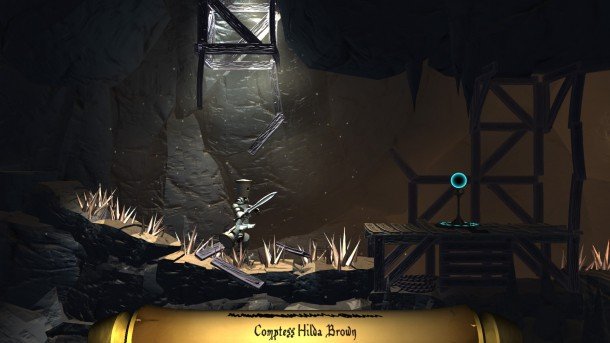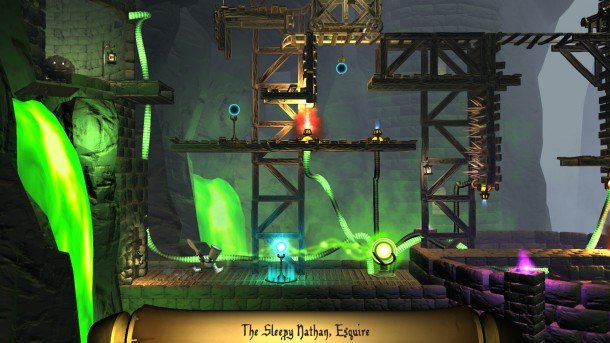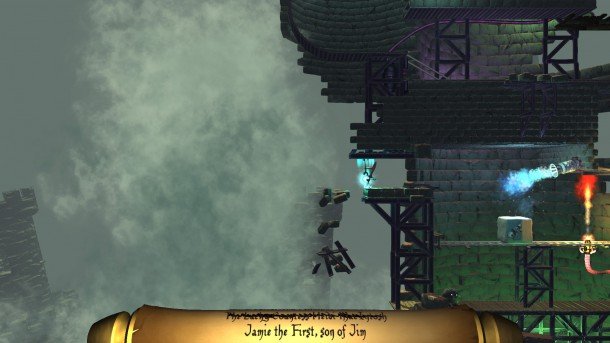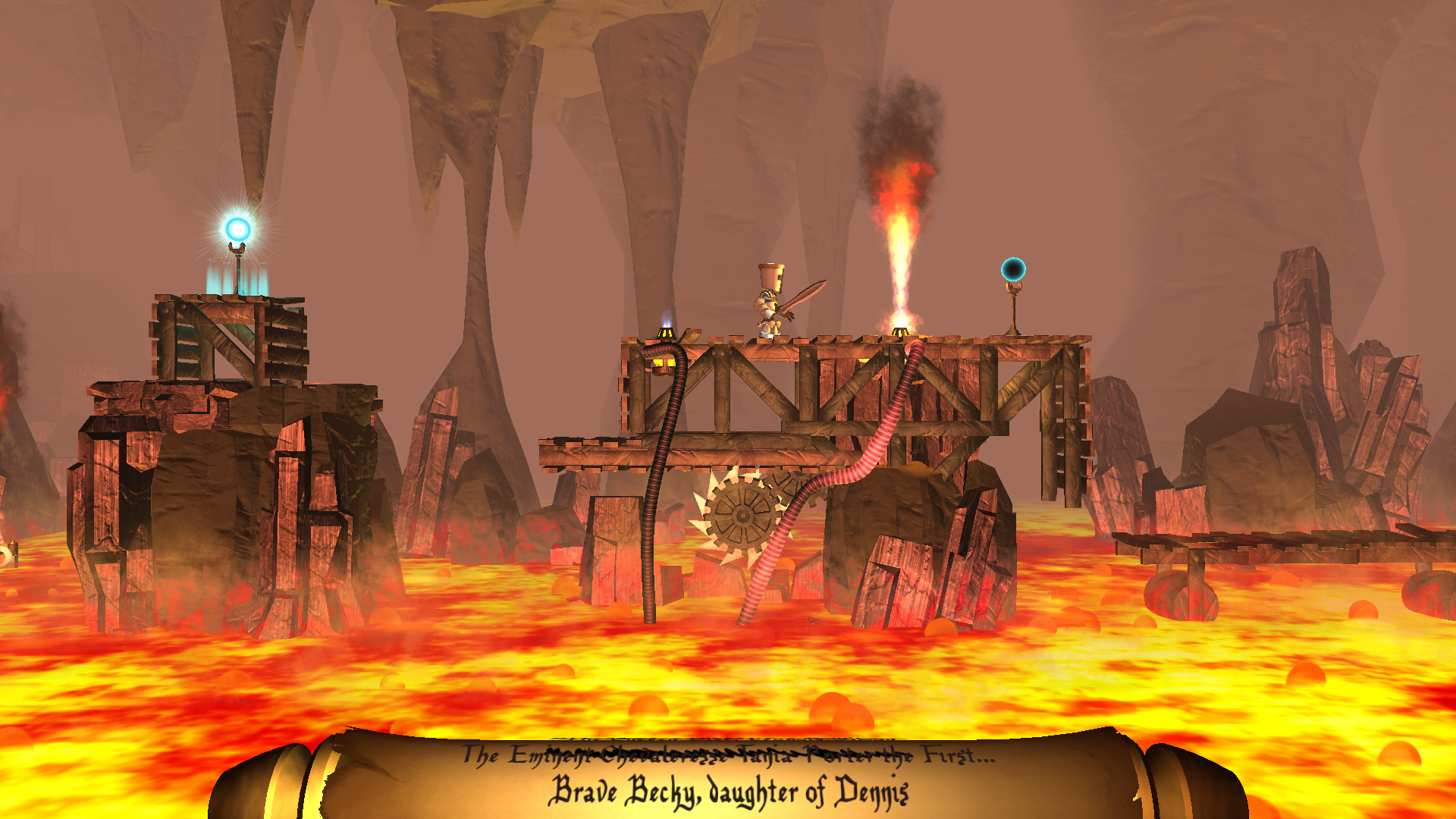Our Verdict
An inventive puzzle game thats too short and easy to recommendworthwhile only for the novelty of its concept
PC Gamer's got your back
I love how death is such a versatile tool in games. It can mean failure, total defeat, or be the first of many; it can be tragic, it can reveal new information, it can be funny. In Life Goes On, collapsing into a heap of silly limbs is the only way forward. Using death as a puzzle solving tool is a smart and inventive subversion of the usual fail state, and I'm surprised I haven't seen it done like this before. I'm also disappointed that it was executed so weakly.
The concept is introduced well. I spawn as a brave knight in a 3D-rendered, 2D side-scrolling stage, and immediately fall into a pit of spikes. My impaled corpse still dangling from the steel, I respawn and use it as a stepping stone to progress. With infinite lives, death is a tool instead of a punishment—corpses become pathways or weights to hold down switches, and respawn checkpoints take on unusual importance. It's clever, but the idea is squished into small, easy puzzles that don't require much thought.

There are 51 stages across three zones—The Mines, The Mountain, and The Castle—and I finished all of them in less than three hours, according to Steam. That means that no one puzzle took me longer than three and a half minutes to solve, but my average (removing time I spent in the menu or grabbing screenshots) was probably more like two minutes. In most stages, I worked out the central puzzle instantly, or very quickly after hitting any available switches or buttons to see what they do.
Though they aren't hard to figure out, there are lots of clever uses of death as a puzzle-solving mechanic, and I especially like the checkpoint system. Where you respawn matters: I can activate a checkpoint, hit a switch to move it past a flame, die, then respawn on the other side. The best stage asks me to activate electrocution switches (by wedging my body into an electrical circuit and dying) in one correct order, making sure that every time I trigger a switch, I'll respawn in the right spot to activate the next.

I also like the cannons, which let me fire my limp corpse and bank it off walls. But except for one or two stages, none of Life Goes On's many puzzle elements—buttons, switches, cannons, fire traps, ice cubes, conveyor belts with retractable spikes, switches that only stay activated until you die, gravity beams—are ever used in more than one or two ways. Nearly every stage feels like an introductory stage, and while later stages are longer, each segment is still easy to figure out.
There are hints of platforming, which might have added some difficulty if they weren't so simple and forgiving. The best parts had me ride blocks of ice (actually my own frozen corpses) down ramps and over jumps to leap ravines, another of the many things I wish Life Goes On played with more. The only truly tricky bits are a bonus: little fuzzy monsters who hide in each level and eat you if you get close enough. Being eaten is an optional objective, and sometimes requires undoing progress on the main puzzle. It's not a very attractive secondary task, and isn't all that hard either.

The final stages in each zone are the best. They're as easy as the rest, but there's some element of motion in each—rising lava, an avalanche, a crumbling castle—that adds urgency (though not actual difficulty) and visual flair to an otherwise dull-looking game. Speaking of which, the knight character is cute, but I tired of his bobble-headed walk quickly, and it's not all that funny when he dies and ragdolls. It's clearly supposed to be, but ragdolls are only really funny to me when a more realistically-proportioned character wrecks a full 3D space with other physics objects. This is just a doll flopping around.
My favorite part of Life Goes On is its credits sequence. I don't say that to be mean: it really does have a great in-game credits sequence, and beating a puzzle game is always a little satisfying. I don't feel like I accomplished very much, though. Life Goes On is too easy to recommend to adults, and I don't think it was meant for kids, either. It's just a great idea that fails in execution, leaving its potential dangling from the spikes.
Vitals
Price: $13 / £7
Release date: Out now
DRM: Steam
Developer: Infinite Monkeys Entertainment Ltd.
Publisher: Infinite Monkeys Entertainment Ltd.
Multiplayer: None
An inventive puzzle game thats too short and easy to recommendworthwhile only for the novelty of its concept

Tyler grew up in Silicon Valley during the '80s and '90s, playing games like Zork and Arkanoid on early PCs. He was later captivated by Myst, SimCity, Civilization, Command & Conquer, all the shooters they call "boomer shooters" now, and PS1 classic Bushido Blade (that's right: he had Bleem!). Tyler joined PC Gamer in 2011, and today he's focused on the site's news coverage. His hobbies include amateur boxing and adding to his 1,200-plus hours in Rocket League.


